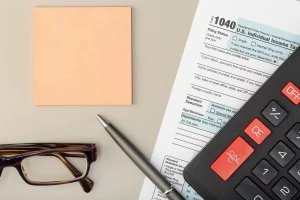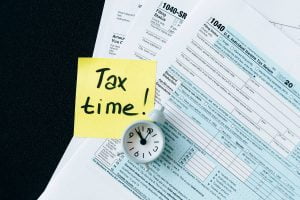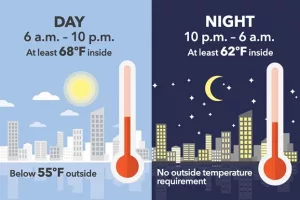NYC Income Tax Guide (2025)
Go Back To Previous PageIncome tax is critical to living and working in New York City. Suppose you understand how filing your taxes works and can comply with the regulations and avoid unnecessary penalties. In this guide, you’ll learn the basics of tax rates, including types of taxes. Today, we’ll explore the tax rates and brackets for 2024, as well as deductions and available tax credits. New York City is among the few cities in the United States that require individuals to pay personal income taxes in addition to federal taxes. The NYC personal income tax is calculated and paid annually on your state income tax return, and every income-earning individual living in NYC must bear it.
return, and every income-earning individual living in NYC must bear it.
Who is required to pay New York City income taxes?
Each resident of New York who works in New York City pays a personal income tax to the city. This tax is in addition to their current state and federal taxes. Your tax depends on how much money you make and which city tax rate applies to your income.
There are no standard deductions available.
New York City Income Tax and NYC Tax Brackets 2024
The city income tax applies to New York City’s residents and non-residents.
- As a resident, you should pay the city income tax if your taxable income meets particular requirements.
- For non-residents, the tax applies if you earn income from a job or business within the city.
The tax rate for city income tax ranges from 3.078% to 3.876%, depending on your income level. The tax calculation is based on your taxable income, which includes wages, salaries, tips, and bonuses.
New York City rates are 3.078%, 3.762%, 3.819%, and 3.876%, depending on your bracket. Where you fall within these brackets depends on your filing status and your income.
Below are the New York City income tax rates you’ll pay on the tax return you file by April 2024.
1. Married Filing Jointly
- less than $21,600 – 3.078%
- between $21,600 and $45,000 – $665 plus 3.762% of the excess over $21,600
- between $45,000 and $90,000 – $1,545 plus 3.819% of the excess over $45,000
- over $90,000 – $3,264 plus 3.876% of the excess over $90,000
2. Single or Married Filing Separately
- less than $12,000 – 3.078%
- between $12,000 and $25,000 – $369 plus 3.762% of the excess over $12,000
- between $25,000 and $50,000 – $858 plus 3.819% of the excess over $25,000
- more than $50,000 – $1,813 plus 3.867% of the excess over $50,000
3. Head of Household
- less than $14,400 – 3.078%
- between $14,400 and $30,000 – $443 plus 3.762% of the excess over $14,400
- between $30,000 and $60,000 – $858 plus 3.819% of the excess over $30,000
- more than $60,000 – $2,176 plus 3.867% of the excess over $60,000
Are there any NYC Tax Deductions?
Unfortunately, there are no tax deductions.
NYC calculates your income based on your net New York State taxable income after you claim any applicable state income tax deductions.
NYC Income Tax Credits
There are no deductions available for personal income tax.
Therefore, the best way to reduce the tax bill is to offset what you owe by deducting tax credits from your state income taxes. The following tax credits may help reduce the total taxes you pay.
- New York City School Tax Credit: available to NYC residents with a total household income of $250,000 or less. Individual taxpayers who cannot claim are eligible for a $63 credit, and those filing jointly would receive a $125 NYC school tax credit. To claim this credit, you cannot do it as a dependent on another filer’s tax return.
- NYC Household Credit: If you cannot claim on another filer’s tax return, you are eligible for the New York City Household Credit of between $15 and $30.
- NYC Earned Income Credit equals 5% of your allowable federal earned income tax credit.
- NYC Child and Dependent Care Credit: NYC residents who paid qualifying child care expenses for a child under four years of age may be eligible for up to 75% of their New York State Dependent Care Credit. To qualify for the NYC Child and Dependent Care Credit, your household income cannot exceed $30,000.
- NYC Real Property Credit: This credit is available to renters and homeowners who reside in a property not exempt from real property taxes. The total household income must be less than $200,000. The credit is up to $500.
When and how must you file your NYC income taxes (e.g., online, by mail)?
Filing a tax return in New York City is easy! The main thing you’ll need to know is the deadline, which is April 15th.
Don’t forget it may take up to 90 days for the NYS Tax Department to process your refund! You can file for free online at the New York State Tax Department website or by mail. Several tax preparation software programs are available to make filing your NYC taxes easier and check your refund status.
If you own a business in New York City, you must file returns with both the city and the state. Luckily, you only have to enter your information once, and both agencies will receive all the necessary details.
Unincorporated Business Tax
The business tax is taxable to individuals, partnerships, and limited liability companies (LLCs) conducting business in New York City. It’s based on your enterprise’s net income, calculated at a 4% rate for most corporations.
If you’re a sole proprietor or single-member LLC, you should pay the business tax if your business activities’ income in the city exceeds $95,000. For partnerships and multi-member LLCs, the tax applies if the business’s net income from activities in the town exceeds $95,000 and the enterprise’s allocated share of the partnership or LLC’s net income exceeds $25,000.
Can You Avoid NYC Income Tax?
As mentioned earlier, there are no deductions available for personal income tax.
If you’ve already tried offsetting what you owe with state income tax credits, you’re out of options for further reducing your taxes. However, some loopholes could help you avoid paying personal income tax.
Part-year residents
The most significant and apparent loophole is to live in the city for 182 days or fewer of the year. If you can manage this, you can save big on taxes.
Since personal income taxes don’t apply to non-residents, living in the city for less than half the year means you won’t have to fork out the cash to cover personal income tax, even if you have a residence there.
to non-residents, living in the city for less than half the year means you won’t have to fork out the cash to cover personal income tax, even if you have a residence there.
The bad news is that, unless you’re well-off or own two homes, achieving this is difficult and impossible for most people.
Commute to work in the city.
The second option, and one which more and more people are choosing, is to live outside the city but commute to work daily. For example, you can avoid NYC income taxes if you live in New Jersey and commute to work in the city.
And you can reach Manhattan in as little as thirty minutes from cities like Hoboken, Jersey City, or the many suburban towns in NJ.
You’re close enough to the city to visit and work, but reap the benefits of cheaper housing, more space, and avoiding that pesky tax. You’re not limited to NJ, so explore many great commuter towns in Connecticut and Long Island to save on your tax bill.
What happens if you don’t pay your NYC income taxes on time (e.g., interest and penalties)?
New York City’s income tax contributes a percentage to the government every full year. Residents who miss the deadline for filing their taxes or fail to pay the amount due will incur interest and other penalties. The penalty for late payment is 5 percent of the amount due per month or partial month until paid in full, with an additional penalty of 0.5 percent for every extra month without payment.
Additionally, NYC charges interest on any unpaid amounts at a rate of 9 percent per year, compounded monthly. To avoid these extra costs, it is best to stay informed and pay your taxes on time.
Work with a Reliable and Reputable Broker
Are you planning to purchase, sell, or rent property in New York City? To avoid common pitfalls, it’s best to work with a reliable real estate broker. At Nestapple, we’re here to help you with the process for a stress-free transaction. Contact us today for more information.


